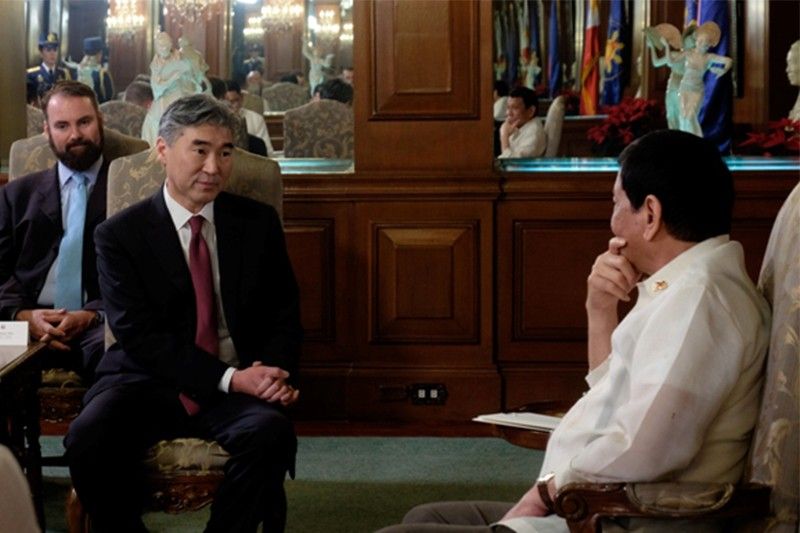Conflicting policies paint Philippines as unreliable ally, expert says
March 27, 2018 | 4:17pm

Batongbacal said there is a disconnect in the Philippines accepting US military aid and Duterte attacking the US in his speeches
Presidential Photo / Rene Lumawag, File
MANILA, Philippines — Uncertainty in Philippine policies in the South China Sea could lead traditional partners to see Manila as an unreliable partner and may lead them to sever their alliance with the country, an expert warned Tuesday.
Jay Batongbacal, an associate professor at the University of the Philippines' Institute for Maritime Affairs and Law of the Sea, said that the disconnect between actions on the operational level and the official positions and statements on the policy level show "unresolved fissures in Philippine external security policy."
These could sow doubts among the country's traditional security partners about future Philippine behavior and follow-through on security treaty commitments, he said.
"(I)f these disjointed actions continue they may translate into perceptions of the Philippines as an unreliable or unworthy alliance partner, and over time give cause to sunder the alliance itself," Batongbacal wrote in The Interpreter, a publication of Australia-headquartered think tank Lowy Institute.
The maritime law expert said that this disconnect between actions and policy can be seen in two recent developments.
The first, according to Batongbacal, was the receipt by the military of six ScanEgale drones from the US, which could augment Philippine capabilities in surveillance, maritime domain awareness, humanitarian assistance response and counterterrorism.
He said that this asset transfer was the latest in a series of assistance since the previous administration and gave the impression that the Philippine-US alliance remains firm.
However, this was followed by a speech by Philippine President Rodrigo Duterte where he signaled Manila's unwillingness to be involved in US-led wars.
This showed, in Batongbacal's opinion, non-involvement or no support to any possible future military actions of any scale between the US and North Korea.
"Duterte thus took a very public swipe at the Philippine–US relationship, which obviously weakens it as a tool for or against geopolitical leverage and calls the Philippines' commitment to the alliance into question," he said.
"Duterte's statement seems to run counter to that expected of like-minded, coordinated allies," he added.
Closer ties to China
The Philippines under Duterte has forged warmer and closer ties to China, a stark contrast to the frosty relations between the two nations under the previous administration.
Duterte has opted to put Manila's international arbitration victory in 2016 on the backburner in exchange for closer economic cooperation with China.
He has also asserted publicly that the Philippines is breaking its alliance with the US and will start aligning with China and Russia, but these two countries have shown little appetite to disrupt traditional military alliances in the region, according to Batongbacal.
The asset transfer and Duterte's critical statements indicate that there were still problems in coming up with a "unified, principled and consistent" approach to bringing the Philippines toward a neutral, independent and non-aligned position, he said.
This resulted in more transactional, improvisational and opportunistic standing alliance cooperation activities, he added.
BrandSpace Articles
<
>
Philstar
- Latest
- Trending
Trending
Latest
Trending
Latest
Recommended
































